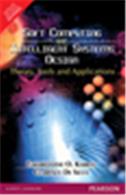Soft Computing and Intelligent Systems Design: Theory, Tools and Applications

|
Author(s):
Author:
Fakhreddine O. Karray
- ISBN:9788131723241
- 10 Digit ISBN:8131723240
-
Price:Rs. 1380.00
- Pages:584
- Imprint:Pearson Education
- Binding:Paperback
- Status:Available
-
|
Traditional artificial intelligence (AI) techniques are based around mathematical techniques of symbolic logic, with programming in languages such as Prolog and LISP invented in the 1960s. These are referred to as "crisp" techniques by the soft computing community. The new wave of AI methods seeks inspiration from the world of biology, and is being used to create numerous real-world intelligent systems with the aid of soft computing tools. These new methods are being increasingly taught at the upper end of the curriculum, sometimes as an adjunct to traditional AI courses, and sometimes as a replacement for them. Where a more radical approach is taken and the course is being taught at an introductory level, we have recently published Negnevitsky's book. Karray and Silva will be suitable for the majority of courses which will be found at an advanced level. Karray and de Silva cover the problem of control and intelligent systems design using soft-computing techniques in an integrated manner. They present both theory and applications, including industrial applications, and the book contains numerous worked examples, problems and case studies. Covering the state-of-the-art in soft-computing techniques, the book gives the reader sufficient knowledge to tackle a wide range of complex systems for which traditional techniques are inadequate.
Table of Content
PART I FUZZY LOGIC AND FUZZY CONTROL
- Introduction to intelligent systems and soft computing
- Fundamentals of fuzzy logic systems
- Fuzzy logic control
PART II CONNECTIONIST MODELING AND NEURAL NETWORKS
- Fundamentals of artificial neural networks
- Major classes of neural networks
- Dynamic neural networks and their applications to control and chaos prediction
- Neuro-fuzzy systems
PART III EVOLUTIONARY AND SOFT COMPUTING
- Evolutionary computing
PART IV APPLICATIONS AND CASE STUDIES
- Soft computing for smart machine design
- Tools of soft computing in real-world applications
|
Salient Features
- Integrates theory and practice through the use of numerous worked examples
- Includes case studies in different areas where soft-computing techniques are applied in real-world situations
- Extensive coverage of control applications
- Extensive student and lecturer support available via the Web (including Matlab files)
|
|
|
|
|